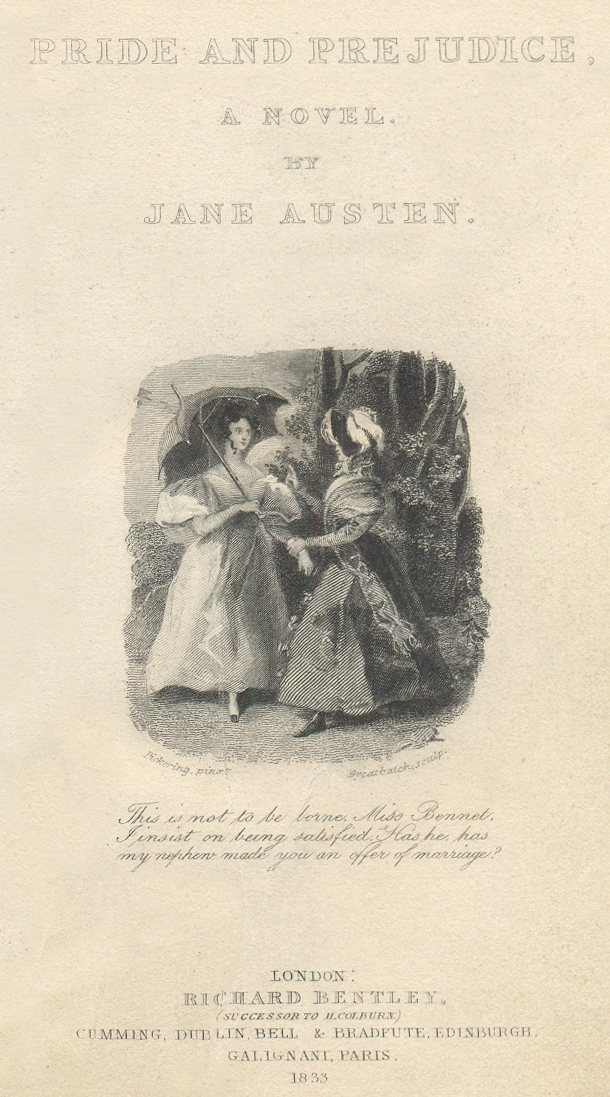 |
| Title page of the first illustrated edition of "Pride and Prejudice" |
Marriage runs rampant in Jane Austen's "Pride and
Prejudice". It seems to be on every page of the book. There are marriage
arrangements, marriage hopes, bad marriages, good marriages and engagements.
Literally every character is involved in something that pertains to marriage.
Mr. Bennet suffers through his marriage with amusement. Mrs. Bennet obsesses
over getting her daughters married. The youngest Bennet daughters obsess about
getting themselves married as much as their mother does and so on.
*Spoilers ahead
The eldest Bennet daughter, Jane, falls in love with Mr.
Bingley in "Pride and Prejudice". He loves her back, but his friends
and family believe an engagement to be a bad idea. Mrs. Bennet wants to see her
eldest daughter married to the rich Mr. Bingley. Elizabeth and Mr. Bennet just
want to see Jane happy. In the end, all turns out well for Jane and she marries
Mr. Bingley. This is a good example of how much marriages of the time were
influenced by opinion. It is also a good example of Ms. Austen's love for happy
endings.
Elizabeth doesn't dwell on the idea of marriage much in the
novel. However, she finds herself falling in love with a man that she believes
she has good reason to despise. In classic Jane Austen style, Elizabeth marries
this man, who happens to be rich, and lives happily ever after. This is the
main plot line of the story and it played out so well that the novel has been
popular for nearly 200 years.
Elizabeth was proposed to before she married Mr. Darcy by
her cousin Mr. Collins. Elizabeth refused to marry her cousin. He went on to
marry Elizabeth's best friend, which she strongly opposed. However, in the end, it
was a happy match and Elizabeth grew to accept it.
Speaking of engagements and cousins, Elizabeth's husband was
engaged to his cousin before he met Elizabeth. Of course, love prevailed (Thank
you, Jane Austen.) and the engagement was broken. Nonetheless, this engagement
gave readers a good example of how marriages among the aristocracy were handled
at the time. Furthermore, it gave us a little intrigue and kept us guessing. .
. kind of.
Elizabeth's youngest sister Lydia also gets married in "Pride
and Prejudice". Her marriage is a shameful one. She ran off with a
disgraced military officer and was only saved from disgrace herself when Mr.
Darcy came to her rescue and forced the officer–Mr. Wickham–to marry her. This
little twist leaves the reader loving Mr. Darcy, hating Mr. Wickham and shaking
their head and Lydia. It also gives us a glimpse of how societal whims played a
huge role in marriages of the time.
There are many other marriage issues that are alluded to in "Pride
and Prejudice". There is an attempted engagement with Georgiana by Mr.
Wickham for money. Miss Bingley's wish
to marry Mr. Darcy is alluded to. The ill-advised coupling of the elder Bennets
is mentioned, as is the happy coupling of Elizabeth's aunt and uncle. There is
even a small mention that Mary Bennet felt Mr. Collins may be a good match for
her. Marriage is not just a theme in "Pride and Prejudice". It is the
theme.
No comments:
Post a Comment